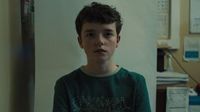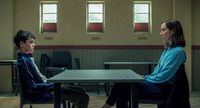The premiere of the British miniseries Adolescencia on Netflix, which took place on March 13, 2025, has quickly gained attention for its impactful storytelling and cinematic technique.
With four gripping episodes, the series revolves around a 13-year-old boy, Jamie Miller (played by Owen Cooper), who is accused of murdering his classmate Katie Leonard. The story unfolds in a small town and highlights the emotional turmoil experienced by Jamie, his family, and the community.
From the very first scene, viewers are thrust into a chaotic police raid, capturing the moment when Jamie is taken from his home. This dramatic introduction sets the tone for a series that explores the depths of adolescent struggle, questioning how a child, seemingly innocent, could be implicated in such a grave crime.
Written by Jack Thorne and starring Stephen Graham as Jamie's father, Eddie, the series differentiates itself by analyzing the psychological motivations behind the crime rather than focusing solely on who committed it. As Thorne explains, “Contar un drama sobre ‘por qué se hizo’, en lugar de un ‘quién lo hizo’, esperamos que involucre a la gente en diferentes preguntas,” aiming to engage the audience in deeper reflections on youth and violence.
The series has been widely praised for its realistic portrayal of teenagers and the sociological issues they face today, including bullying, socio-economic pressures, and the toxic elements of masculinity. The complex character of Jamie reflects both a victim and an aggressor, caught in a world where societal expectations and peer pressure drive him toward a violent act.
Director Philip Barantini employs a single-shot filming technique, which enables viewers to experience the overwhelming emotions alongside the characters. Each episode unfolds in real-time, allowing for a palpable sense of urgency and intensity. This style has been compared to a cinematic experience that captures the angst of adolescent life.
Additionally, the series explores themes of modern masculinity, often scrutinizing how young boys are raised to conform to outdated ideals of strength and dominance. The hashtag #MaleRage emerges as a focal point for discussions surrounding the portrayal of masculinity and how it can potentially fuel violent behavior. As stated by Thorne, “We wanted to examine what’s happening in society where youth violence is happening—not merely judge it.”
The narrative also touches on the controversial 'Incel' culture, an extension of discussions about alienation among young males who feel rejected by society and women. The term 'Incel', originating from the 1990s as a support group, has evolved into a misogynistic philosophy that blames women for men's lack of romantic success. This aspect of the story is poignantly illustrated through the character of Jamie, who grapples with rejection and feelings of worthlessness.
In fact, real-life incidents of school violence and troubling motivations have influenced the writing of Adolescencia. Stephen Graham acknowledged that the storyline was inspired by a series of violent acts involving young males, addressing the urgent need for dialogue around teenage mental health, the pressures of social media, and the realities of adolescent life today.
The conclusion of the series leaves viewers with more questions than answers, as it dives into the aftermath of the murder and how Jamie’s family copes with the emotional and social ramifications of the incident. This open-endedness invites speculation from fans, many of whom are already discussing potential plotlines for a second season, such as exploring the victim’s family dynamics or the future of Jamie’s friend Ryan, who was involved in the crime.
As discussions continue online, the series is not merely a narrative about a crime; it provokes critical thinking about the consequences of unchecked societal issues that contribute to youth violence. It serves as a potent reminder that in the complex web of adolescence, understanding and communication are vital. “La serie muestra algo que ocurre mucho durante la adolescencia, que es que, sin quererlo, los padres descuidan a los chicos. Esos encierros largos de los chicos en sus habitaciones… hace sentir que son inescrutables”, noted Sara Zusman de Arbiser, emphasizing the importance of connection and dialogue in families.
In summary, Adolescencia has established itself not only as a striking drama but also as a significant social commentary relevant to the challenges faced by today’s youth. Its innovative approach to storytelling, coupled with the pressing themes it highlights, makes it a must-watch for anyone invested in understanding the psyche of the next generation.








